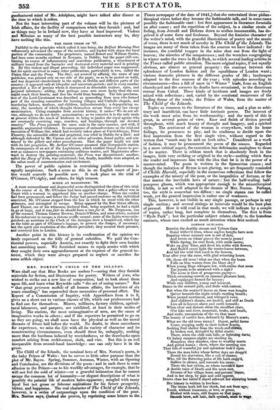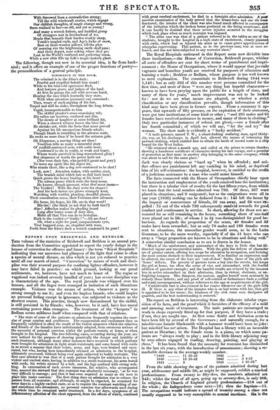MRS. NORTON'S CHILD OF THE ISLANDS.
WHO shall say that Blue Books are useless P—seeing that they furnish materials for fiction, and illustrations for poetry. Writers of yore, who wished to strike out a new line of composition, had to look about them upon life, and learn what Reynolds calls " the art of seeing nature." But 41 that great primunt mobile of all human affairs' the barrister of six years standing," has superseded these necessities of personal effort. The Report of a Commission of Inquiry, with Appendixes from A to Z, gives us a short cut to various classes of life, which our predecessors had to find out for themselves. Miners, milliners, factory children, agricul- tural labourers, and paupers, are exhibited, at least in their modes of living. The statists, the most unimaginative of men, are the cause of imaginative works in others ; and if the reporters be permitted to go on as they are going, we shall soon have the physical as well as the moral diseases of felons laid before the world. No doubt, in these succedanea fcir experience, we miss the life with all its variety of character and its counteracting circumstances, even should these be, unhappily, nothing more than the hardness induced by wretchedness, or the drawbacks upon Comfort arising from recklessness, sloth, and vice. But this is an evil inseparable from second-hand knowledge : one can only have it in the gross. The Child of the Islands, the nominal hero of Mrs. Norton's poem, is the baby Prince of Wales : but he serves to little other purpose than the plot of Mr. Bayes. Spring, Summer, Autumn, Winter, with an Opening and Conclusion, are the divisions of the poem : and in each there is some allusion to the Prince-as to his worldly advantages, for example, that he hill not feel the cold of winter—or a graceful intimation that he cannot Canape the common lot' of humanity—or elegant descriptions of what is Possibly the palatial life of modirn heirs-apparent ; mingled with many loyal but not gross or fulsome aspirations for his future prosperi virtue; and bakmiess., The real character of The Child of the Isla however is a Series of outpourings upon the condition of the pOor. Mrs. No;ton sap, (indeed she proves, by reprinting some letters to the Times newspaper of the date of 1841,) that she entertained these philan-
thropical views before they became the fashionable talk, and in some cases possibly the fashionable cant : but first appearance in literature forestalls an after comer ; and the repetition of the subject, in a similar strain of feeling, from Jerrold and Dickens down to scribes innumerable, has de- prived it of some force and freshness. Beyond the feminine character of the writer's mind, with the graceful illustrations of poetry and the music
of verse, there is not much of novelty in The Child of the Islands. The
images are many of them taken from the sources we have indicated : for instance, the youthful trapper in the mine shut out from the light of heaven; the miseries of the sempstresses ; and the wretches congregating in winter under the trees in Hyde Park, to which several leading articles in
the Times called public attention. The more original topics, if not equally
obvious, are almost as general property : the contrast between the splendours of London fashion and the squalidness of London want ; various domestic pictures in the different grades of life ; landscapes adapted to the four seasons of the year • with episodes according to circumstances—thus a fall of snow in " Winter " leads, from an English churchyard and the sorrows its deaths have occasioned, to the disastrous retreat from Cabul. These kinds of incidents 'and images are freely mixed with reflections ; and, varied by the continual recurrence of the leading theme of the rondo, the Prince of Waluf, form the matter of The Child of the Islands. Topics so common to the literature of the times, and a plan so arbi- trary and inartificial, can have little intrinsic power. The interest of the work must arise from its workmanship : and the merit of this is great, in several points of view. Ease and finish of diction prevail throughout, with much beauty of thought and imagery, and a spirited
style. The sentiment of the woman is everywhere, with its home
feelings, its proneness to pity, and its readiness to decide upon the first impression from the first single view, without regard to the truism that "much may be said on both sides." , Considered as a work of fashion, it may be pronounced the poem of the season. Regarded in a more critical aspect, the execution has deficiencies analogous to those of its matter. There is' seldom much that is absolutely fresh in the images, little very striking or original in the style—nothing which fixes
the reader and impresses him with the idea that he is in the power of a
master-mind. The poem is written in the Spenserian stanza ; and though the imitation of Byron is not glaring, we are frequently reminded
of Childe Harold, especially in the numerous reflections that follow-the
examples of the misery of the poor, or the inequalities of fortune, or for that matter the inevitable laws of nature : but the , half-wailing half-
pompons gloom, which was appropriate enough to the misanthropical
Childe, is not so well adapted to the themes of Mrs. Norton. Perhaps too, the style is somewhat too diffuse : no single stanza can be called weak, yet the general impression is rather one of weakness. This, however, is not visible in any single passage, or perhaps in any single section • and several sittings at intervals would be the best plan of perusal. How it will read in that mode, we will indicate by a couple of topics, rather long, but complete in themselves. The first is from "Hyde Park" ; but the particular subject relates chiefly to the homeless outcasts, whose case excited so much attention when first noticed.
LONDON OUTCASTS.
Betwixt the deathly stream and Tyburn Gate
Stand witlier'd trees, whose sapless boughs have seen Beauties whose memory now is out of date, And lovers on whose graves the moss is green I While Spring, for ever fresh, with smile serene, Woke up gray Time, and drest his scithe with flowers, And flash'd sweet light the tender leaves between, And bid the wild bird carol in the bowers, Year after year the same, with glad returning hours.
Oh, those old trees what see they when the beam Falls on blue waters from the bluer sky?
When young Hope whispers low, with smiles that seem
joyous oyous to be answered with a sigh? The scene is then of prosperous gayety- Thick-swarming crowds on summer pleasure bent, And equipages formed for luxury; While rosy children, young and innocent, Dance in the' onward path, and frolic with content.
But when the acatter'd leaves on those wan boughs Quiver beneath the night-wind's rustling breath;
When jocund merriment, and whisper'd vows, And children's shouts, are hush'd, and still as Death
Lies all in heaven above and earth beneath; When clear and distant shine the steadfast stars, O'er lake and river, mountain, brake, and heath, And smile, unconscious of the wo that mars The beauty of earth's face, deform'd by Misery's scars;
What see the old trees THEN? Gaunt, pallid forms
Come, creeping sadly to their hollow hearts, Seeking frail shelter from the winds aritsftdrist,
In broken rest, disturb'd by fitful starts; There, when the chill rain falls, or lightning darts,
Or ball* summer-nights are stealing on,
House less they slumber, close to wealthy marts
And gilded homes : there, where the morning sun That tide of wasteful joy and splendour look'd upon.
There the man hides whose better days are dromid Round his starvation, like a veil of shame. Who, till the fluttering pulse of life hath Suffers in silence, and conceals his name:- . There the lost victim, on whose tamisit'd fame
A double taint of Death and Sin must rest, Dreams of her village. home and parents Mime,
And in her sleep; by pain and cbld oppreist, Draws close her tatter'd shawl athwart her shivering breast.
Her history is written in her face: The bloom bath left her cheek, but not from age; Youth, without innocence, or love, or grace, Blotted with tears, still lingers on that page;
Smooth brow, soft hair, dark eyelash, seem to wage
With futrowed lines a contradiction strong; Till the wild witchcraft stories, which engage Our childish thoughts, of magic change and wrong, Seem realized in her—so old, and yet so young ! And many a wretch forlorn, and huddled group Of strang,ers met in brotherhood of wo, Heads that beneath their burden weakly stoop, Youth's tangled curls, and Age's locks of snow, Rest on those wooden pillows, till the glow Of morning o'er the brightening earth shall pass; And these depart, none asking where they go; Lost in the World's confused and gathering mass, While a new slide fills up Life's magic-lantern glass.
The following, though not new in its essential idea, is far from hack- nied ; and it offers an example of one of the proper functions of poetry— the personification of a general principle.
IGNORANCE IN THE DOCK-
The criminal is in the felon's dock: Fearful and stupifled behold him stand ! While to his trial cold spectators flock, And lawyers grave, and judges of the land. At first he grasps the rail with nervous hand, Hearing the case which learnedly they state, With what attention ignorance can command: Then, weary of such arguing of his fate, Torpid and dull he sinks, throughout the long debate.
Vapid, incomprehensible to him
The skilful pleader's cross-examining wit; His sullen ear receives, confused and dim, The shouts of laughter at some brilliant hit, When a shrewd witness leaves the biter bit. He shrinks not, while the facts that must prevail Against his life unconscious friends admit; Though Death is trembling in the adverse scale,
He reeks no more than if he heard the autumn gale.
Oh Eloquence, a moving thing art thou! Tradition tells us many a mournful story Of scaffold-sentenced men, with noble brow, Condemn'd to die in youth, or weak and hoary, Whose words survived in long-remembered glory! But eloquence of words the power bath not (Nor even their fate, who perish'd gaunt and gory) To move my spirit like his abject lot, Who stands there, like a dog new-sentenced to be shot!
Look, now! Attention wakes, with sudden start, The brutish mind which late so dull bath been! Quick grows the heavy beating at his heart ! The solemn pause which rests the busy scene,
He knows, though ignorant, what that must mean— The Verdict ! With the Jury rests his chance !
And his lack-lustre eye grows strangely keen, Watching with wistful, pleading, dreadful glance, Their consultation cease, their Foreman slow advance.
His home, his hopes, his life, are in that word ! His ties ! (for think ye not that he hash ties?)
Alas! Affection makes its pleading heard
Long after better sense of duty dies, Midst all that Vice can do to brutalize.
Hark to the verdict—" Guilty !"—All are foes! Oh, what a sight for good, compassionate eyes, That haggard man, as, stupified with woes,
Forth from the felon's dock a wretch condemn'd he goes !



























 Previous page
Previous page